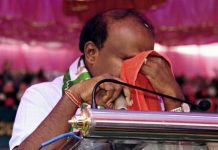
You know you’re in the presence of a legend when the audience, which has been eating out of your hands so far, begins heckling you when your questions run longer than they should. It is a sign that the audience will not be satisfied until they see and hear as much as humanly possible from the man they came to see. That the audience firmly believed that every moment Amitabh Bachchan spent silent on stage was a moment of this once-in-a-lifetime opportunity they would never get back. If TEHELKA Editor-in-chief Tarun Tejpal, who hosted the session, had ended it at the scheduled time, there might have been a mini-riot. Wisely, when the bell rang, he immediately assured the crowd that the talk would go on.
It was, as Tejpal said, the most starstruck session in THiNK’s history, as Bachchan and Robert De Niro, two titans of cinema whose names are known to millions, were both present under one roof. De Niro, who will formally take the stage on Sunday afternoon, was watching in the audience; and when the session finally ended, he came onto the stage for a photo-op for the ages.
Bachchan, who said that the presence of a live audience “always brings fear” of not being acceptable, of making mistakes, was reserved, but engaging. He spoke of his childhood in one of India’s most elite families, growing up in an atmosphere of literature and poetry (his mother let him follow his acting dreams since “one poet in the family [was] enough”), to parents who came from two entirely different backgrounds. Of his early struggles in the industry after being rejected as a newsreader by All India Radio. Of the heights he reached once he broke through as a leading man in Zanjeer and Abhimaan. Of the fall from his perch and bankruptcy, of his reinvention on the small screen through Kaun Banega Crorepati.
It is a cliché, but what shone through the session was Bachchan’s utter humility and the legendary work ethic (he made sure, he said, that he would never miss a call time). Asked repeatedly to describe what goes into his decision to choose which films to do, he replied, “I’m bad at picking scripts; I just took work whenever I could. I just wanted what I was doing to be acceptable.” The younger crowd, he acknowledged, was more organised, more choosy when it came to their films. He talked about the blind faith he placed in his directors, how the only disagreements he’d have with them would be registered when the script was being narrated; once shooting would start, they would be boss.
At one point, Tejpal asked him whether the rumours of Indira Gandhi getting him his first break by writing a letter of recommendation were true. “I never saw the letter or anyone who got this letter. But,” he said, asking De Niro whether he agreed, “even a letter from God can’t get you a role in a film.”








